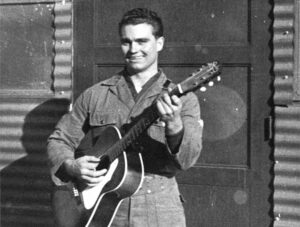If you’re going to be an ambassador, it’s best to know two things: What you represent and who you’re representing it toward. That’s the way an ambassadorship works.
When it comes to country music, it’s hard to find anyone better qualified for the title of “ambassador” than Marty Stuart. Not only has Stuart forgotten more than most folks have ever known about country music, but he’s also versatile — versatile to the point he can relate to other musical genres, performers and fans.
Representing country music on the world stage is what Marty Stuart does best. And he doesn’t do a bad job as a performer either.
Stuart was born to be a country musician. His life’s work has earned the respect of other musicians and executives in the country music industry. In many ways, Stuart is the face of the business. Whenever a media outlet wants to talk to someone about country music history, Marty Stuart is the man they call.
He stands for tradition — but he also plays music that falls into just about every subgenre beneath the country music umbrella. Why? Because that’s what ambassadors do. They introduce other “cultures” to the one they represent.
And, yes, in the process, Stuart has even cut a truck-driving record or two. One of the many songs Stuart performs as a cover artist is among the most well-known trucking songs ever recorded — “Six Days on the Road.” Paul Davis originally cut “Six Days” in 1961, but it became famous two years later when Dave Dudley recorded it as the title song on an album of trucking songs.
Dudley’s “Six Days” wasn’t the first trucking song ever recorded; it just seems that way. It gave birth to a new generation of songs about the working man that was followed by Merle Haggard, Red Sovine and a host of performers who made a living off trucking music through the 1970s.
The song has also done well for musicians other than Dudley. It’s been covered by many performers over the years, not the least of which is Sawyer Brown, a band that reprised Dudley’s No. 2 hit song and reached No. 13 on the country charts 35 years later.
Stuart doesn’t do a bad job with “Six Days” himself.
Lyrically, Stuart’s version of the trucking classic remains in harmony with the original. He doesn’t change any words, and he even sings with some of the same voice inflections and mannerisms as Dudley. But that’s where the similarities end.
Stuart, whether backed by his “Fabulous Superlatives” or a couple of other musicians, brings a distinct bluegrass style to the song. The style, heavy on acoustic instruments — including Stuart’s favorite, the mandolin — offers instrumental interludes throughout and features a traditional bluegrass and country upright bass.
With the lyrics telling the story of a driver’s trip from Pittsburgh headed down the eastern seaboard, Stuart’s bluegrass effort almost feels like it’s focused on the leg of the trip passing through coal mining country like West Virginia.
The cover isn’t as gritty as Dudley’s version, and it’s not as commercial as that of Sawyer Brown. Stuart applies his personal style to the song and makes it his own. And “Six Days” is not not the only of Stuart’s songs to fall into the theme of trucking music.
In “Whole Lotta Highway” (also known as “Truck Drivin’ Man”), Stuart and his band stick to his signature acoustic sound to tell the same tale so many other songs have told about driving trucks. Whether it’s piling up the miles, knowing waitresses at every truck stop in the country, or measuring his paycheck by his logbook, as Stuart sings, he’s “seen a whole lotta highway with a million miles to go.”
If you’re looking for something a bit more original from Stuart, look no further than “Truck Driver’s Blues,” a song he reportedly wrote for Connie Smith — the singer he vowed to marry when he was 12 years old (and, in fact, did eventually marry in 1997).
The song is heavy on acoustics, and the lyrics cover just about everything you’d want to hear in a trucking song — a rig that takes the curves, “two tons of steel” shaking his nerves, countless hours on the highway and gallons of coffee all make an appearance in the lyrics. And, of course, the trucker has a “honey waiting back home” — or as Stuart refers to her, “a hillbilly honey.” He’s even named his truck after her: “Connie, Connie, Connie.”
Pumping brakes and slamming gears, Stuart sings of not being home in what seems like 10 years. The upbeat tempo gives a “road rhythm” to the song, but it’s a departure from Stuart’s usual heavy bluegrass influence. Sure, Stuart features his mandolin, but it’s band member Kenny Vaughn on the acoustic guitar that truly carries this truck driving song home.
For a change of pace, Marty Stuart’s “Way Out West” isn’t exactly a truck driving song (although the narrator HAS been on the road a long time), nor is it a clean-cut road song. The tune is more spiritual or mystical in tone and revolves around the aftermath of pills — like the little white pills so many performers sing of in “Six Days.”
The lyrics aren’t so much about a yearning for home either. Frankly it’s hard to follow the lyrics unless you’ve popped one of the little pills Stuart sings of, whether they’re green, black or blue or provide an “indigo haze.” It’s not a particular good song to listen to behind the wheel. “Way Out West” will have, as Stuart sings, your world spinning “round and round and round and round and round.” Still, the song is another example of Stuart’s versatility as an artist.
Until next time, remember as you roll down the road with your classic country songs blaring from iTunes, there’s someone in Nashville keeping those tunes alive for future generations.
Marty Stuart is the 21st century’s classic country jukebox.
Since retiring from a career as an outdoor recreation professional from the State of Arkansas, Kris Rutherford has worked as a freelance writer and, with his wife, owns and publishes a small Northeast Texas newspaper, The Roxton Progress. Kris has worked as a ghostwriter and editor and has authored seven books of his own. He became interested in the trucking industry as a child in the 1970s when his family traveled the interstates twice a year between their home in Maine and their native Texas. He has been a classic country music enthusiast since the age of nine when he developed a special interest in trucking songs.







the article you have written on Marty Stuart, is one of the best articles I believe ever written about the man, You have described him perfectly. He is that of an amazing man and extremely talented musician.
thank you.
respectfully, BG.